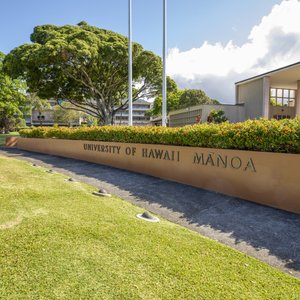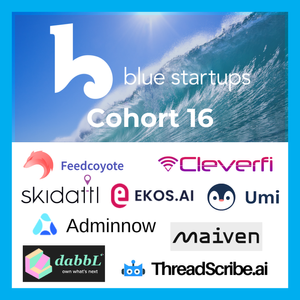That’s it – Pacific Business News’ inaugural Inno Madness online competition is over, and based on your votes, the winner is ... TurnoverBnB, with 1,369 votes (56.2%) over Parklinq with 1,069 (43.8%).
“It’s great to be recognized by the Pacific Business News readers,” said Founder and CEO Assaf Karmon. “We have a worldwide customer base but being supported by our local community feels amazing. TurnoverBnB is a local success story birthed from the University of Hawaii at Manoa’s Shidler College of Business, through Blue Startups and with support of the Hawaii Angels investor group. Almost all of our Hawaii employees are Shidler graduates and we want to create a role model of success for local entrepreneurs.”
TurnoverBnB is a cleaning service app that helps customers schedule, pay, and find vacation rental cleaners and services. Parklinq is a public parking app that seeks to reduce carbon emissions while helping drivers find parking spaces, and generating income for those with extra parking spots.
Inno Madness has been PBN’s bracket-style online challenge where readers voted for companies that they thought were doing the most to advance innovation in Hawaii. Reasons for voting could’ve been tied to one’s connection with any given startup’s mission, cause, or tenure — among numerous other factors to be considered.
And Inno Madness was designed to shine a spotlight on innovative, fast-growing local businesses in the Islands. To that end, we reached out to our participants with two big questions: What are your top goals for growing your business this year and how are you going about them? And what does Hawaii need to do, collectively, to make it easier for businesses like yours to thrive?:
This computer vision and artificial intelligence company has significant ongoing R&D in data science, deep learning, convolutional neural networks and object detection and tracking to address problems in marine sustainability and conservation.
What are your top goals for growing your business this year, and how are you going about them?
Our top goal for this year would be to end the year with 50% of our revenue coming from grants and 50% coming from commercial products and our consulting business. We have another goal to bring on at least one more machine learning engineer and possibly a data scientist.
What does Hawaii need to do, collectively, to make it easier for businesses like yours to thrive?
Continued support from Hawaii Technology Development Corp., and possibly the University of Hawaii will help a lot. For us, the Hawaii Small Business Innovation Research Grant and Small Business Technology Transfer program are very helpful. We have also had helpful conversations with HTDC to bridge the gap between companies like ours and the university system, whether it’s technical people or business-minded people, we have an interest in all of that.
Running a high-tech software company in Hawaii is always difficult to find local talent. We would be very interested in something that kept connections with computer scientists from Hawaii that go to the Mainland and then have an interest in coming back and are looking for the right fit.
Tax credits similar to what we had with Act 221 — but the research and development credits, not the investment credits, as those were a disaster and probably sunk the program. Also, I was completely against [including] large tax breaks for TV shows and movies filmed in Hawaii. In my view that aspect diluted and defeated the purpose [of Act 221 which aimed to incentivize tech in Hawaii].
— Jimmy Freese, CEO
A small business that performs professional, scientific, system engineering, and technical services.
What are your top goals for growing your business this year, and how are you going about them?
Winning longer duration and larger contracts.
— Dr. Bill Goodman, president and CEO
A University of Hawaii at Manoa startup that researches and develops solar and biomedical technologies.
What are your top goals for growing your business this year, and how are you going about them?
Hawaii Innovation Laboratory, or HIL, engineers disruptive solutions to tackle high-tech challenges. Our vision is to improve lives locally and globally. One of our projects is to develop a portable oxygen delivery system that can provide day long oxygen and fits in a purse. Our goal is to take it from the lab to a working prototype, pilot-scale production, and hire engineers to accelerate the development by the end of this year. We have received support from the National Institute of Health and the National Heart, Lung, and Blood Institute to develop the prototype. Also, we are applying for further support to achieve the above goals by the end of 2022.
What does Hawaii need to do, collectively, to make it easier for businesses like yours to thrive?
HIL's translational biomedical research is aimed to bridge the basic research breakthroughs to transform new technologies into market applications. Various risks may lead to failure; hence, de-risking the technology at an early stage of lab-to-market is critical. Hawaii may support the businesses like us with the product and business development at an early stage when the risk of failure is high.
— Arif Rahman, PhD, CEO
A software company that specializes in advanced mixed signal integrated circuits with applications in particle tracking and time of flight measurements.
What are your top goals for growing your business this year and how are you going about them?
With the energy and research sector returning to full power, we are looking forward to again fulfilling the specialized needs of our partners and clients. We have also signed a distribution agreement with CAEN of New York to facilitate direct sales of our hardware.
We remain blessed to have a high-ranking research university in our backyard, with which we've had a number of fruitful collaborations. We look forward to expanding this partnership, whether in workforce development or in expanding shared access to equipment and facilities.
What does Hawaii need to do, collectively, to make it easier for businesses like yours to thrive?
Nalu Scientific has benefitted from the many economic diversification efforts of our legislators and partners like the HTDC. We hope these efforts continue to be funded, and even expanded, so that high tech can grow in Hawaii, supporting local companies that can hire local talent like we have.
— Isar Mostafanezhad, founder and CEO
A public parking app that seeks to reduce carbon emissions while finding spaces for parkers, and generating income for those with extra parking spots.
What are your top goals for growing your business this year and how are you going about them?
PARKLINQ is hyper-focused on perfecting our client relations and general process improvements for the remainder of 2022. We will of course be continuing to respond to RFPs from landowners and lot managers, and these unsolicited incoming requests are actually resulting in around 50% of our new accounts each month. I guess this means that at this time PARKLINQ is taking a more passive approach to growth and dedicating additional resources to improving service and response to incoming inquiries.
What does Hawaii need to do, collectively, to make it easier for businesses like yours to thrive?
Hawaii government facilities and public spaces are beginning to take notice and we are in fact very pleased with recent developments across the state. Current ambiguity on certain aspects of the tax code would be one place in which the state could improve to help new technologies thrive across the state.
— Tyler Saenz, founder and product architect
A baby food company that sources sustainable, locally grown ingredients with no additives, preservatives, or artificial flavors.
What are your top goals for growing your business this year and how are you going about them?
Our top goals for Piko Provisions this year are to source 10 times the amount of locally grown food that we did last year through the development of new Hawaii-grown and made products to be able to raise keiki from infancy up through adolescence. We want to help make it easy to raise a generation on local food that takes care of and gives back to our community. Paired with that goal are actionable steps to help be a beacon for our industry across the globe by transitioning our packaging to be fully recyclable and also becoming Clean Label Project certified and continue to grow community access across the state by adding new retailers and points of distribution. This is more than just a pouch, this is a movement towards a resilient food system starting with the most delicate and discerning among us. We owe it to them to do better.
What does Hawaii need to do, collectively, to make it easier for businesses like yours to thrive?
Collectively to make it easier for businesses like Piko Provisions to thrive, we need a concerted effort put towards updating and advancing infrastructure available to mid-tier value chain producers that are sourcing local goods. There is a groundswell of incredible entrepreneurs across the state that have limited production and processing resources, at best, to truly scale their business and in turn their impact in the local community.
— Ethan West, founder and CEO
A software company that utilizes advanced machine learning to provide utilities and distributed energy providers a path to rapidly deploy and easily manage thousands of demand response and thermal energy storage assets.
What are your top goals for growing your business this year and how are you going about them?
Our top goals are revenue, increased channel partners, and scaling current customers. We are doing this in two ways. By adding additional behind the meter asset types we can aggregate, forecast, and provide grid services for including common area HVAC in multi-family buildings and small businesses along with EV charging stations. And through talent acquisition. The latter is difficult in a very competitive market.
What does Hawaii need to do, collectively, to make it easier for businesses like yours to thrive?
Hawaii needs access to non-dilutive funds so innovative startups can move more quickly with scale and add talent. This would allow for bridging the talent gap we often see, building up the skillsets of those already in our community. Creating more incentives for local businesses and institutions to procure services from companies that are built and headquartered in Hawaii.
— Forest Frizzell, co-founder and CEO
A Honolulu-based agricultural technology firm that uses data to advise farmers.
What are your top goals for growing your business this year and how are you going about them?
Smart Yields remains committed to a strong and sustainable agriculture sector in Hawaii. Land is no longer the most scarce resource — we need farmers who embrace technology and understand the big picture so that they can better support local families as well as strengthen Hawaii's food security.
What does Hawaii need to do, collectively, to make it easier for businesses like yours to thrive?
The jobs of tomorrow are here, but the skilled workforce is lagging, and local companies are still forced to recruit from outside Hawaii. The state needs to step up its investment in UH, and UH needs a hard reboot of its research commercialization and innovation initiatives. Robust support of entrepreneurship and startups must also continue, so Hawaii residents can start and run businesses just as easily as they can work for them.
Ryan Ozawa, co-founder and CEO
A cleaning service app that helps customers schedule, pay, and find Airbnb vacation rental cleaners and Airbnb cleaning services.
What are your top goals for growing your business this year and how are you going about them?
TurnoverBnB is growing rapidly this year, we have tripled our worldwide head count and sales and we hope to do the same next year! We are hiring for multiple marketing positions in our Honolulu office and would love to fill them all with top local talent.
What does Hawaii need to do, collectively, to make it easier for businesses like yours to thrive?
Hawaii has never been a better place to do business with the ability to manage a geographically distributed teams getting better every day. We would love to see more local talent interested in getting involved and working with local startups.
The state should continue to support local innovation programs like Blue Startups and UH Pacific Asian Center for Entrepreneurship programs.
— Assaf Karmon, founder and CEO
Our other Inno Madness participants were:
LifeDNA — A company that uses customers' DNA samples to generate personalized nutrition, health, fitness, and wellness reports.
Malama Solar - A residential photovoltaic panel and battery storage business that was awarded the distinction of being PBN's Fastest Growing Companies in Hawaii last year.
Nimbus AI LLC — A team that uses a data-driven approach and machine learning to forecast cloud cover for the solar industry.
Pear Suite — A cloud-based platform that enables volunteers, healthcare workers, and students to identify and address the health and social service needs of older adults in a scalable and cost-effective way.
Polu Energy — A company that is developing a "containerized clean energy generator" powered by the salt ions in ocean water, groundwater, and seawater desalination brine.
Shaka Guide — A tourist information travel app that offers location-based tours using storytelling and music by local artists.
Shaka Shoots LLC — A photography service that offers unlimited sessions with unlimited photos that are then uploaded to an online gallery, with customers' favorite pics selected for professional editing.



